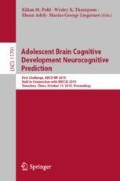Abstract
Ensemble learning aggregates a set of models to solve the same problem and usually gives better results than a single model. We apply the ensemble method to seek a better prediction in the Adolescent Brain Cognitive Development Neurocognitive Prediction Challenge (ABCD-NP-Challenge). We manage to obtain a much better predicting accuracy on the fluid intelligence with the proposed ensemble method using volumetric data from T1w brain image than a single prediction model. In addition, we compare the results of adolescents with young adults using data from the Human Connectome Project (HCP). We find that raw fluid intelligence scores in HCP without regressing out covariates such as age and brain volume can be much better predicted by brain structure. Also, the prediction, in general, is more accurate in young adults than adolescents.
H. Ren and X. Wang—Equally contribute to this paper.
Supported by the Health Sciences Center for Computational Innovation (HSCCI) at the University of Rochester.
Access this chapter
Tax calculation will be finalised at checkout
Purchases are for personal use only
References
Rohlfing, T., Zahr, N.M., Sullivan, E.V., Pfefferbaum, A.: The SRI24 multichannel atlas of normal adult human brain structure. Hum. Brain Mapp. 31(5), 798–819 (2010)
Freund, Y., Schapire, R.E.: A decision-theoretic generalization of on-line learning and an application to boosting. J. Comput. Syst. Sci. 55(1), 119–139 (1997)
Rohlfing, T., Cummins, K., Henthorn, T., Chu, W., Nichols, B.N.: N-CANDA data integration: anatomy of an asynchronous infrastructure for multi-site, multi-instrument longitudinal data capture. J. Am. Med. Inf. Assoc. 21(4), 758–762 (2013)
Dale, A.M., Fischl, B., Sereno, M.I.: Cortical surface-based analysis: I. Segmentation and surface reconstruction. Neuroimage 9(2), 179–194 (1999)
Bilker, W.B., Hansen, J.A., Brensinger, C.M., Richard, J., Gur, R.E., Gur, R.C.: Development of abbreviated nine-item forms of the Raven’s standard progressive matrices test. Assessment 19(3), 354–369 (2012)
Zhou, Z.-H.: Ensemble Methods: Foundations and Algorithms, 1st edn. Chapman and Hall/CRC, New York (2012)
Breiman, L.: Bagging predictors. Mach. Learn. 24(2), 123–140 (1996)
Friedman, J.: Greedy function approximation: a gradient boosting machine. Ann. Stat. 29(5), 1189–1232 (2001)
Chen, T., Guestrin, C.: XGBoost: a scalable tree boosting system. In: Proceedings of the 22nd ACM SIGKDD International Conference on Knowledge Discovery and Data Mining, pp. 785–794. ACM, New York (2016)
Dietterich, T.G.: Ensemble methods in machine learning. In: Kittler, J., Roli, F. (eds.) MCS 2000. LNCS, vol. 1857, pp. 1–15. Springer, Heidelberg (2000). https://doi.org/10.1007/3-540-45014-9_1
Cook, R.D., Forzani, L., Zhang, X.: Envelopes and reduced-rank regression. Biometrika 102(2), 439–456 (2015)
Author information
Authors and Affiliations
Corresponding author
Editor information
Editors and Affiliations
Rights and permissions
Copyright information
© 2019 Springer Nature Switzerland AG
About this paper
Cite this paper
Ren, H., Wang, X., Wang, S., Zhang, Z. (2019). Predict Fluid Intelligence of Adolescent Using Ensemble Learning. In: Pohl, K., Thompson, W., Adeli, E., Linguraru, M. (eds) Adolescent Brain Cognitive Development Neurocognitive Prediction. ABCD-NP 2019. Lecture Notes in Computer Science(), vol 11791. Springer, Cham. https://doi.org/10.1007/978-3-030-31901-4_8
Download citation
DOI: https://doi.org/10.1007/978-3-030-31901-4_8
Published:
Publisher Name: Springer, Cham
Print ISBN: 978-3-030-31900-7
Online ISBN: 978-3-030-31901-4
eBook Packages: Computer ScienceComputer Science (R0)

